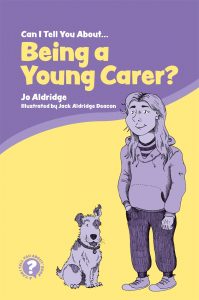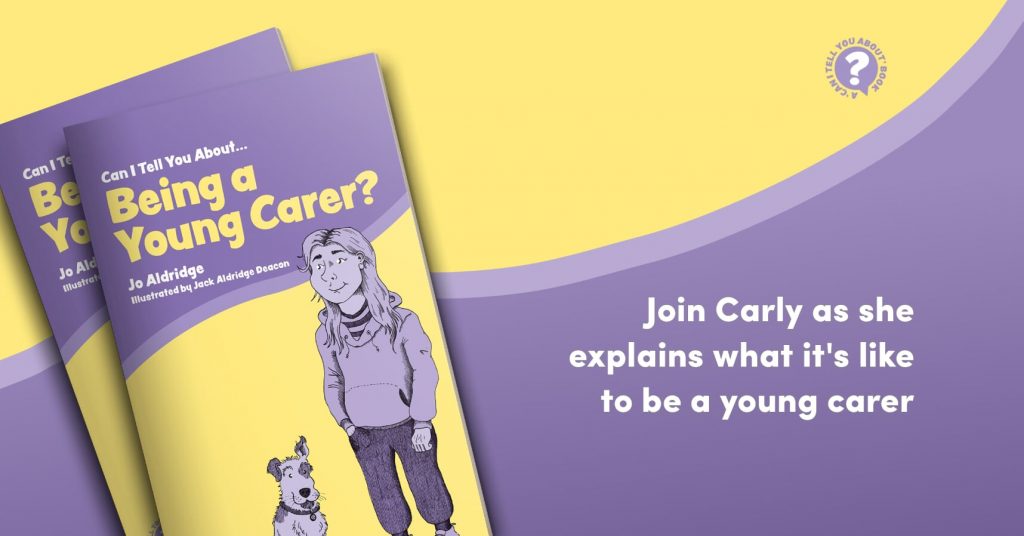A Young Carers Awareness Day blog by director of the Young Carers Research Group and author of Can I Tell You About Being a Young Carer?, Jo Aldridge.
Young carers are children and young people who provide care for someone in their family who is ill or disabled; for some this can be a parent, for others a sibling or grandparent. We do not know precisely how many young carers there are in the UK– figures range from 166,000 – to 700,000. The variation in statistics here is, in part, because definitions used in studies to describe young caring lack consistency and also because different methods are used to identify and investigate young carers’ experiences. But it is also because some children are wary of disclosing the fact that they are caring for a family member for fear of interventions by health or social services that may lead to family separations. This means that some children are caring unrecognised, unsupported and often with very little knowledge or understanding about the condition, and prognosis, of the person for whom they are providing care.
Many children and young people provide the sort of care we would normally associate with an adult – toileting and bathing a loved one, administering medication, cooking and cleaning as well as having to look after younger siblings. Some children also help to care for a parent, or other relative, who has mental health problems or both mental and physical health conditions, or substance misuse issues. In the book, Carly, is caring for her mother who has Multiple Sclerosis, but she also has depression, and it can make life especially difficult for families like Carly’s when someone has more than one health problem – often called ‘complex needs’ by health and social care professionals.
For some young carers the amount of care they provide at home can seriously affect their education, their social and family lives and their chances of a happy future that is free from caring. For others, caring can be a rewarding experience, but this is more likely to be the case when they and their families are supported by consistent and good quality health and social care services. Recent years have seen cuts to services and this has put more pressure on families to cope with illness or disability themselves and for children to provide care because essential services are not available.
For many children in this situation caring can take up a lot of their time and can mean they worry more about their parent or other family member who is ill. Sometimes children are not given any information or advice about their parent’s/relative’s condition or what it might mean for them and their future and this can make children worry about going to school and what happens to their parent or relative left alone at home. Some young carers do not go out with their friends for this reason and others will sometimes hide the fact that they are caring, or that there is anything wrong at home, because they do not want to seem different or to draw attention to themselves.
Children and young people who are having to provide care at home unrecognised and unsupported need help from professionals such as health and social care workers and school teachers. They need recognition, understanding and support. All evidence tells us that young carers need to be listened to and want someone they can talk to, someone who is not going to judge them or intervene in their lives in ways that might make them fearful or wish that they had not disclosed the fact that they are providing care. Young carers also need support for themselves – as children – and for their families (in the form of whole family support). Legislation introduced in 2014 (the Care Act and the Children and Families Act) means that young carers and their families have a right to an assessment of their needs and that professionals such as health and social care workers have a duty to identify young carers and carry out needs assessments.
More than anything though young carers also need opportunities just to be children, to have fun and enjoy being with their families – to care about rather than for them.
If you are an educator and would like to raise awareness of the plight of young carers with students you teach, Jo has put together a handy selection of questions to stimulate discussion below.
In-class activity: showing empathy and understanding for Carly in school
Key questions:
1. Given that Carly’s mum has said she is happy for staff to talk to Carly about what is going on at home – about mum’s health problems and Carly’s caring responsibilities – what is the best way for teachers to support Carly in school?
2. Are there any support or policies currently in place in school to support children who are carers?
3. What about outside school – other local or national organisations?
4. What advice could be given to Carly’s school friends about the best ways to support her?
5. What would be the best ways for teachers and Carly’s school friends to make sure she does not feel worried or anxious about talking to them about what is happening at home?
Can I Tell You About Being a Young Carer?
A Guide for Children, Family and Professionals
£8.99
This illustrated book is an introduction to life as a young carer. Follow Carly as we learn what responsibilities she has in the home, why she cares for her mum, her worries and concerns, as well as all the positive aspects of being a carer. Carly’s story raises awareness about the needs of young carers for children, families and professionals.

Hi, I’m the parent of an Adult with Autism, I have two other children one who’s 21 and another who is 14. Being young siblings and sometimes carer to their brother was very hard for them both growing up.
I would really like to be able to help other children who are going through the same.
Do you do leaflets which I could copy to give out to pupils at my daughter’s school (Secondary)?
Hi Lorenza, thanks for your comment, lovely to hear from you! I have sent you an email.